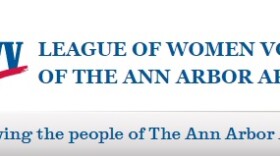In our bi-weekly conversation with the League of Women Voters of the Ann Arbor Area, 89.1 WEMU's Lisa Barry talks about the upcoming primary election coming up on August 7th.
Lisa talks to Washtenaw County Chief Deputy Clerk/Register and Director of Elections Ed Golembiewski and league member Cheryl Depner.
You will see candidates running in “three” parties this midterm primary, Republican, Democrat, and Libertarian*. Millages, if you have one to vote on in your district (for example would be millages for fire departments or AATA), are the next column over from the political parties. Major proposals you have heard about will be on the general election ballot in November. You will be choosing among the candidates listed within one party. Voters cannot split the ballot for Michigan’s US Congressional representatives, Washtenaw Districts 7 and 12, one of Michigan’s US Senators, Governor, Secretary of State, all 38 seats in the Michigan Senate, for Washtenaw (that’s districts 22 and 18), all 110 seats in the Michigan House, for Washtenaw (that’s districts 52-55), County Commission Washtenaw districts 1-9, and only in the primary do you choose precinct delegates for a political party.
*In 2016, Libertarian presidential candidate Gary Johnson won 172,136 votes in Michigan, qualifying the state party for a primary election in 2018.
You cannot "split" your ticket (i.e., vote in more than one party column) when voting in the August primary. Voters participating in an August primary must confine their votes to a single party column.
You can "split" your ticket when voting in the November general election. A voter participating in a November general election who wishes to cast a "split" ticket can vote for individual candidates of his or her choice under any party.
This is the most common mistake made by voters in a primary. It’s what election inspector refer to as spoiling a ballot. If you do spoil a ballot when you run it through the machine (tabulator) it will reject the ballot. A election inspector will take your spoiled ballot, cancel it in the system, and then issue a new ballot for you.
Non-commercial, fact based reporting is made possible by your financial support. Make your donation to WEMU today to keep your community NPR station thriving.
Like 89.1 WEMU on Facebook and follow us on Twitter
— Lisa Barry is the host of All Things Considered on WEMU. You can contact Lisa at 734.487.3363, on Twitter @LisaWEMU, or email her at lbarryma@emich.edu






